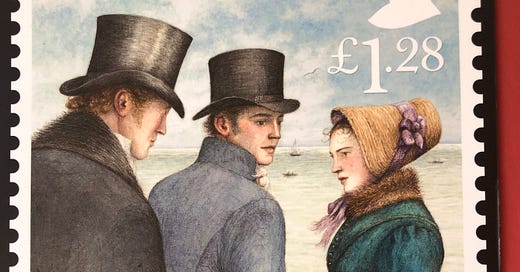Even Jane Austen Needs a Copyeditor
Why the Famed Novelist’s “Best-Chosen Language” Doesn’t Make Her an Expert on Style and Grammar
In 1815, John Murray, a publisher, was considering whether he should publish Jane Austen’s Emma. He asked an editor, William Gifford, for his take on the author. Gifford wrote: “I have read Pride and Prejudice [which had already been published] again—’tis very good—wretchedly printed, and so pointed [punctuated] as to be almost unintelligible.”
Austen herself said that a novel needs to be composed of “the best-chosen language.” Through varied and refined vocabulary, well-expressed and well-structured sentences, carefully constructed plots, restrained but evocative use of description, abundant use of dialogue, and thorough character development, all six of Austen’s novels meet that standard. For polish and precision, she is unmatched.
Nonetheless, the punctuation in the printed version of Pride and Prejudice was wretched and unclear. Part of that may have been errors introduced by or decisions made by the printer and publisher, but Austen certainly had a role in punctuating her own manuscript.
She could pen one of the most famous first lines in English literature and create some of the most memorable characters to appear in print—but she still needed a copyeditor.
The skills of a writer and the skills of an editor are related but distinct. Certainly, good writers self-edit, and they revise extensively. While they may have expertise on how to use language well, they are not necessarily authorities on the underlying structure of language—or deeply knowledgeable about the more arbitrary style rules that govern usage. Basically, Jane Austen can put together much better sentences than I can, but I don’t consider her an expert guide on punctuation or grammar.
Throughout the rest of this year, the Strike-Through issues will be focused on my favorite novelist. In November, I’ll discuss Jane Austen and punctuation, particularly her use of apostrophes, hyphens, and dashes. I’ll close out the year in December with a newsletter about Austen and grammar, focusing on how she intentionally had some characters use poor grammar and how the so-called singular they features in her work (hot-button topic alert!).
If there is a quotation from Austen that you’d like me to weigh in on, leave a comment below.
Beating through the thicket of English, and fighting valiantly against almost-unintelligible punctuation,
Rebekah Slonim
This poster—based on a limited-edition series of stamps in the United Kingdom—hangs in the tearoom at the Jane Austen Centre in Bath. I took the picture after enjoying afternoon tea there in June.





Although Jane Austen was a great English-language novelist, I hesitate to say that she was the best. The language and expression of Tolkien and Lewis are too deep and rich to allow Jane to rule alone. That said, she has the best opening line of an English novel, which is found in *Pride and Prejudice*. But Tolkien certainly comes next with his first line in *The Hobbit*. Both authors snag the reader instantly, which very few authors can and do.
Although I would have to give it more thought, I would argue for J.R.R. Tolkien as the best English-language novelist.